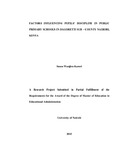| dc.description.abstract | The purpose of the study was to investigate factors influencing pupils’ discipline
in public primary schools in Dagorreti Sub-County Nairobi , Kenya. Despite the
effort made by the government to promote education in the country there are
various challenges that hinder the attainment of quality education. For example,
discipline of the pupils and teachers. Discipline is the most common and rampant
among the challenges encountered in schools (Bosire & Kiumi, (2010). The study
had adopted descriptive survey design, interviewing 23 headteachers, 468 teachers
(DEO’s Office Dagorreti and 23 students leaders in Dagorreti Sub-County. The
study purposely sampled 23 headteachers and 23 pupils leaders by census. Thus
the study took 30 percent of all the teachers. The study also purposively sampled
learners from class 6,7 and 8 pupils’ leaders whereby the researcher interviewed
2 pupils from each school. To collect data, a set of semi-structured
questionnaires for headteachers, teachers and pupils was used. Before the actual
data collection, piloting of the questionnaire and the interview guide was done in
two secondary schools in Dagoretti Sub-County which did not participate in
the actual study. The objectives of the study were: a) to determine the extent to
which training of teachers in discipline management influences pupils’ discipline
in Dagorretti Sub-County, Kenya; b) to examine the influence of management of
school access points on pupils discipline in Dagoretti Sub County, Kenya; c)
to determine the extent to which pupils’ participation in decision making
influences their discipline in Dagoretti Sub-County, Kenya and d) to determine
how guidance and counselling influences pupils’ discipline in Dagoretti SubCounty,
Kenya. To establish the reliability of the instrument, the study used the
test –rest where the second test adminstration was done one week after the first
one. The study generated both quantitative and qualitative data. For quantitative
data, the analysis was done through discriptive statistics by use of frequency,
percentages and averages. From this study it was concluded that 55 percent of the
schools do not have discipline management training for their teachers. The study
found that 55 percent of the schools were not secured with perimeter walls hence
such school had a higher rate of pupils sneaking. Entry of illegal substances was
rampant. Eighty percent of the schools had no signs prohibiting people from
trespassing in the schools. The headteacher sought cooperation from the pupils’
council on the management of school discipline, hence the headteachers had seen
the benefits of providing an avenue for pupils’ particpation. In addition 65 percent
of the schools viewed guidance and counselling as one of the best strategy in
maintaining discipline among pupils. The study therefore recommended that, the
government and head teacher need to organize and offer inservice discipline
management training to teachers for at least once a year through seminars and
workshops. The head teacher and teachers should provide good models for children
to copy, to create cultures of self discipline from the administration down to the
pupils. The head teacher should enforce a culture of collective responsibility of all
stake holders. Further investigation should be carried out to explore the influence
of guidance and counselling on performance. | en_US |

